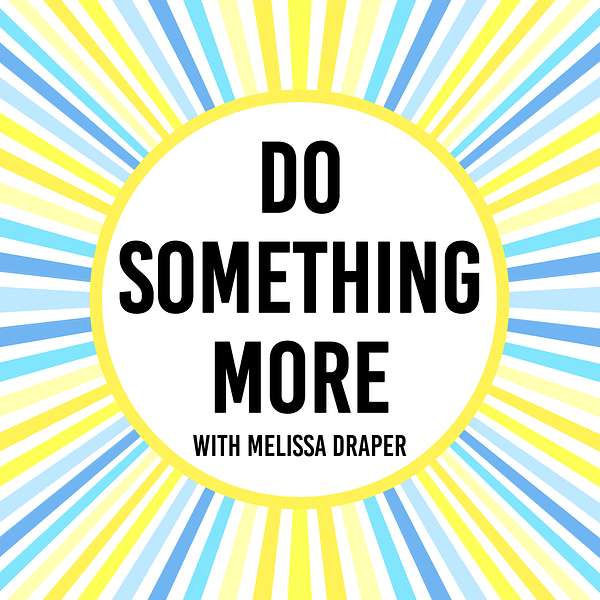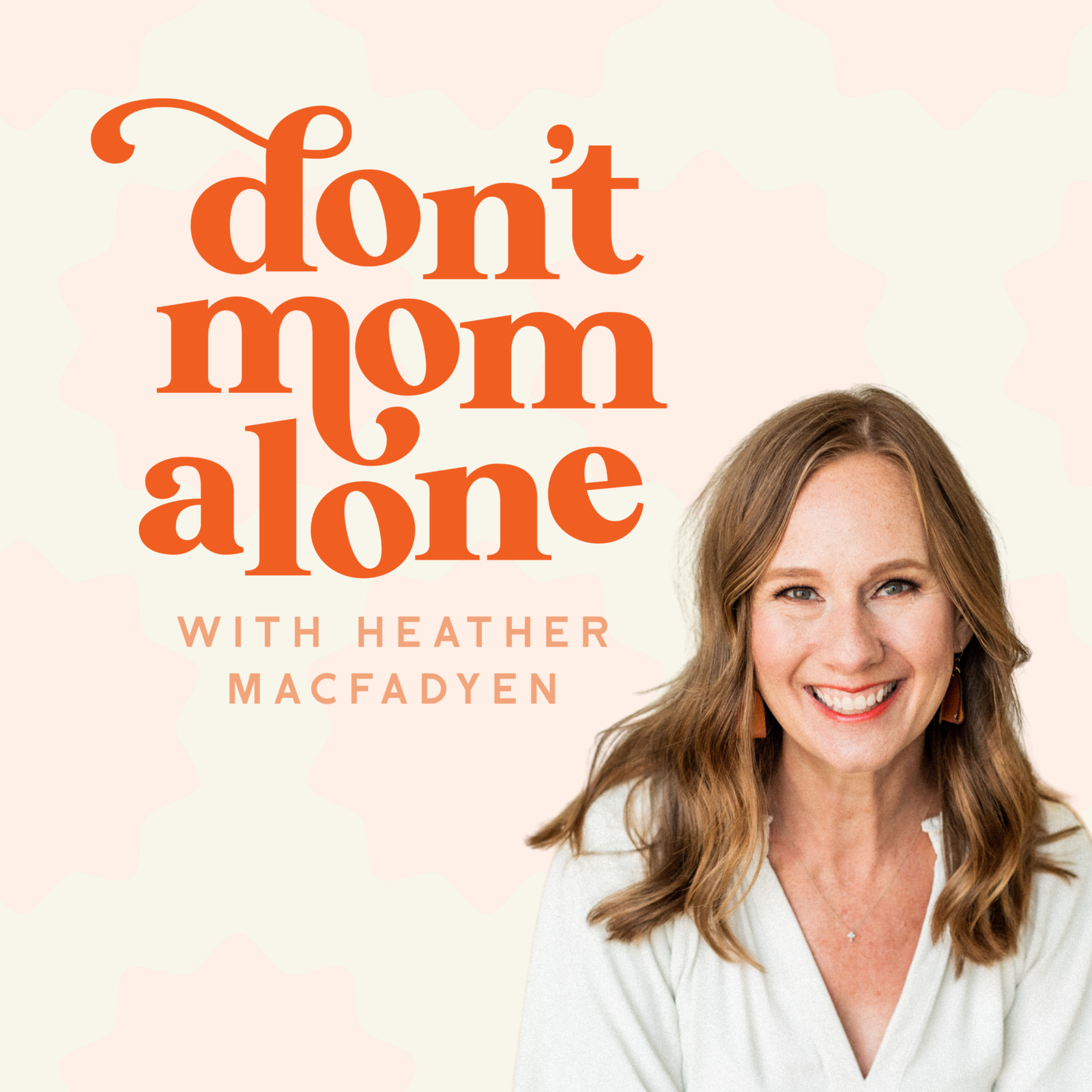
Do Something More-Nonprofit Spotlights & Ways to Serve Your Community
Do Something More is a service-oriented podcast dedicated to sharing inspiring stories of people and organizations who are making a difference. Each week, host Melissa Draper highlights the helpers—volunteers, nonprofits, community leaders, and everyday individuals—who have found meaningful ways to give back and uplift their communities.
Through heartfelt interviews and practical solo episodes, this podcast explores real stories of service, acts of kindness, humanitarian work, and grassroots impact. Listeners will discover simple, actionable ways to serve, volunteer, give back, and create positive change in their own communities.
Whether you’re looking for ways to get involved, searching for volunteer ideas for your family, wanting to support charities you believe in, or simply needing uplifting stories about people doing good, this podcast will motivate you to help, lift, inspire and make a difference.
New episodes every week featuring interviews, nonprofit spotlights, and service-focused conversations.
📩 Contact: dosomethingmore.podcast@gmail.com
📸 Instagram: @dosomethingmore.podcast
Do Something More-Nonprofit Spotlights & Ways to Serve Your Community
74. If You Want to Help After a Natural Disaster
With Hurricanes Helene and Milton that have recently hit the United States, the topic of how to help after a natural disaster is at the forefront of many people’s minds. In this episode I’m sharing just a few ideas of ways you can serve and support communities that have experienced a natural disaster.
Many of us have good intentions and truly want to offer help where it’s needed, so one thing I stress in this episode is making sure you offer your service in a coordinated way through reputable organizations. When done in the right way, every little bit of money or time we have to offer truly can make a difference for so many as they work to put their homes and communities back together.
Links mentioned in the episode:
National Voluntary Organizations Active in Disaster Website
List of Current Members of National Voluntary Organizations Active in Disaster
Donate Blood through American Red Cross
Follow the podcast on social media:
Do Something More Instagram
Do Something More Facebook
Do Something More YouTube
Melissa: With Hurricanes Helene and Milton that have recently hit the United States, the topic of how to help after a natural disaster is at the forefront of many people's minds. In this episode, I'm sharing just a few ideas of ways you can serve and support communities that have experienced natural disaster. Many of us have good intentions and truly want to offer help where it's needed. So one thing I stress in this episode is making sure you offer your service in a coordinated way through reputable organizations. When done in the right way. Every little bit of money or time we have to offer truly can make a difference for so many as they work to put their homes and communities back together. Welcome to the Do Something More podcast, a service oriented show where we highlight the helpers who inspire us all to do something more. I'm your host, Melissa Draper. Thank you so much for being here. Hello and welcome to this episode of the podcast. Today's topic, if you want to help after a natural disaster is something that I thought was especially relevant right now here in the United States. We've seen different communities experience some natural disasters recently, and it's something that's always at the forefront. There always seems to be these different things going on, not just here in the US, of course, but all over the world. And I know many people, when they hear about these things, they want to help. We don't always know how to do that or how to go about that, or sometimes we're just hearing about the hard things that other people are experiencing around the world and we feel a little helpless. But we want to offer support. So today I'm going to be sharing with you just a few ideas. I'm going to be giving you five ways that you can help and serve after a natural disaster, and also hopefully, some other helpful information if that's something you've ever really wanted to do. But first, before we get into that, I just want to remind you that if you want to show the podcast some support, you can, of course, go to Apple Podcasts or Spotify or wherever you listen to podcasts and follow and subscribe, or leave a review, or share this episode or another episode with a friend or family member or anyone that you think would benefit from some of the topics and things that we cover here on the podcast. All of those are great ways to support the podcast and help it grow. So now I want to get into this topic if you want to help after a natural disaster. Again, I'm going to give you several ideas. First, I wanted to start off by letting you know about a website that I found in my research. It is the national voluntary organizations active in disaster. So these are a list of organizations around the country in the United States that specifically help mitigate and alleviate the impact of disasters. And they do this through coordination and communication, and they all work together to more effectively deliver services to communities affected by disaster. So I pulled up that list, and there were many organizations I did recognize, and some that I hadn't heard of. So some you might recognize are ones like the American Red Cross, Habitat for Humanity, the Salvation Army, Samaritan's purse, and those were all familiar ones that I saw on there. But I would encourage you, if you've ever thought about wanting to help after natural disaster, I will leave a link to this website, a link to that specific list, and you can go through for yourself and see the organizations that are involved in these kinds of efforts. These are reputable organizations all over the US, and they serve in a variety of ways. They all have different focuses and things. And I just, I love being able to do that when I'm wanting to help or serve or volunteer myself because it makes it so that you can find one that maybe you are particularly interested in helping with that need or you feel passionate about their mission or their cause. And so as we go through these different ideas that I'm going to share with you today, I want you to keep that list in mind, because it's those organizations that you can work with to do many of the things that I'm going to talk about and share today. So that will be a great place to start. That whole website has a lot of great information for wanting to serve and help after a natural disaster. So what are some ideas? What are some specific things you can do if you've wanted to help after you've heard about a natural disaster, a certain area? Well, first, of course, you can donate money. That is really many times the best way to actually help. I know it seems simple, but it really can make a difference. Any of these organizations I mentioned that are on that list you can donate to, or if you have one near you that you're familiar with that you feel inclined to donate to, I just want to remind you and give you advice to make sure you do your research before donating again. Make sure it's a reputable organization. Make sure that the money you're donating is being used for what you are donating it for. And make sure also that it's an organization that maybe has some experience helping in disaster situations. I know sometimes when these kind of things pop up in the news media. Unfortunately, it attracts a lot of people that want to scam and a lot of fraud, then we want to help and we want to donate, but we need to do our due diligence to make sure our money is really going to these causes that we're wanting to help and support. So do your research before you donate that money. But of course, donating money is always a great and simple way to go about that. And along with that idea of donating, the second thing you can do is to donate items. So again, you would do this through reputable organizations that have experience helping with disasters and that are helping in the specific area that you're wanting to donate to. And it's important that when we start thinking about donating items, that we only give the items when they are requested, and we only give the items on the list of requested items. We do not send anything directly to the affected area and we work through these organizations. It's important that we don't burden these communities that are already in crisis with donations that aren't going to help with the situation or haven't been requested. I remember years ago reading a news story, this wasn't about a disaster. It was a story that came out after the Sandy Hook elementary shooting. So this was a mass shooting at an elementary school back in 2012. I remember reading this news story that the town eventually became overwhelmed with toys and other donations that came pouring in, and it actually became a burden for many people to have to sort through and find a way to take care of all those donations. And it was not a support in that situation because of the magnitude of things that came poor pouring in and the types of things that came pouring in at times. So I know there are always good intentions behind that. People want to help, they have good intentions, they have a good heart. But when we're donating items, we need to make sure that what we are sending will actually help the community and not make it, again, a burden. So if you're wanting to donate, find an organization that's getting ready to go in and, and make sure that they are following requested items, things that have actually been requested, and then just donate those actual items to that area. Third, you can always go and donate blood. So of course, blood donations are always needed, but they can become especially critical after a disaster. And no matter where you live, you can find a donation site and a time near you to donate. Many times you can sign up online. I will again leave a link to those. The American Red Cross is the organization that many of us are familiar with that leads those blood donations. And that can be a great simple thing to do. If you have some time to go, donate some blood. And then, of course, fourth, you can volunteer as boots on the ground in the area of disaster. But there are different ways to go about doing this. If you feel inspired, if this is something that you've wanted to do and you feel like you have the time and the energy to do it, there are some steps that you need to follow. So first, many of these organizations, many things that I read, said that it is very important to remember that you don't self deploy. There's lots of complexities surrounding working in an area affected by a disaster. It can be tricky or even unsafe still to travel there. And so it's important that if you are wanting to serve in this way, if you actually want to go to the area and be boots on the ground, do it through. Again, one of these organizations I mentioned, the national voluntary organizations active in disaster. So again, another one we're all familiar with is the American Red Cross. But many of these organizations also accept volunteers. So find one that you want to serve and work with. Reach out to them. Many of them will already have signups or ways that you can reach out to their organization and then wait for an opportunity or request to come through. And you might need to wait a bit. You might need to wait for it to be safe to travel or for an actual opportunity to appear. But a lot of the advice I read was that if this is something you're wanting to do, just please be patient. Be patient about it. And it's important to remember that while many of these communities are in the headlines, they're in the media. They're on the forefront of everybody's mind for a little bit. The reality is that the help they are going to need will be for months and even years after the disaster. So they get that attention right at first, but that attention lasts for a short time. And many of those areas continue to need help long after the media or others are covering the things going on there. So be patient. Lots of opportunities will pop up, and there will be an opportunity many times for you to go and help in that way, but it might be a little longer than you think, so be prepared for that. And finally, this last piece of advice I have to give as a religious and christian woman, and that is that you can pray. You can pray for those that are affected by these natural disasters. And for me, I really feel that can make a difference. People can be strengthened by our prayers and our positive thoughts. And many times myself, when I have been meditating or praying on something like that, I have had inspiration or thoughts come while I'm praying for specific ways and things that I can do to help, even if those ideas are as simple as donating money. So those are a few of my ideas for if you want to help in a natural disaster, maybe none of them were groundbreaking for you. Maybe you've heard some of these ideas before. Maybe you've heard of that list of the national voluntary organizations active in disaster. But these are all great ideas, great ways to serve if you're interested in serving in that way. So I will leave links to many of these in the show notes. And of course, just want to encourage anyone out there that if you're wanting to help in any situation for local disasters you're hearing about for things around the world, I truly believe that there are always ways that we can serve and we can help again, even if it's as simple as donating money or donating a bit of time. So do your research. Simple Google searches can really give you some answers when you're wanting to help and to serve. Do some research. Read about the area, read about what's really needed. Find reputable organizations that you can work through to donate and do the things that you want to help. I myself have never really been in a huge natural disaster. The closest thing that's happened to my family is back several years ago. There were some fires here in the mountains near our home, and the community right next to us actually had to evacuate their homes. And that was a bit of a scary time for some people. Luckily, the firefighters that came were able to fight those fires and keep them from damaging or destroying any of those homes. But it was a little bit of a tense and scary time. And again, I remember at that time, my children were a little younger and we all wanted to do something to try and help, and so we did. One of the things that I've talked about today, we found organizations that were collecting donations and we went and looked at the list of things that were needed, went to the store, bought some of those things and took them to a donation site. And it was simple, it was small, but it helped us to feel like we were serving this community that was right next to ours and really being affected by those fires. So that is the closest I have personally come to wanting to help and be personally affected by these situations. I know that there are so many that have been affected in much more dramatic ways, and I certainly have them in my thoughts and prayers, and I hope that this episode helped to inspire you if you've ever wanted to serve or help in that way. So thank you so much for being here again. I will leave the links to everything we mentioned in the show notes. There's also links if you would like to follow the podcast on social media. And of course, this week I hope you can find a way to do something more to help lift, inspire, or make a difference.
Podcasts we love
Check out these other fine podcasts recommended by us, not an algorithm.

The Ramsey Show
Ramsey Network
Crystal Paine Show
Crystal Paine
All In
LDS Living
Sunday Sitdown with Willie Geist
Willie Geist, Sunday TODAY
Come Back Podcast
Ashly Stone
Don't Mom Alone Podcast
Don't Mom Alone Podcast